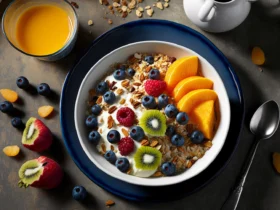In a world marked by its frenetic pace and constant demands, our mental well-being often finds itself in the crosshairs. Anxiety and depression, the silent battles that countless individuals wage, call for a multi-faceted approach to healing. Amidst the array of therapeutic options, emerging research underscores the pivotal role that diet and lifestyle play in alleviating these challenges. Let’s embark on a journey to uncover the culinary and lifestyle choices that science reveals as potent tools in cultivating emotional equilibrium.

The Power of Nutrient-Rich Foods
Scientific inquiry into the mind-gut connection has unveiled a profound truth: what we put into our bodies can influence our mental state. The latest studies highlight a host of foods that harbor the potential to enhance our cognitive resilience. Incorporating these foods into our diet can be a transformative step towards managing anxiety and depression.
- Fatty Fish: Rich in omega-3 fatty acids, fatty fish like salmon, mackerel, and trout offer a natural defense against depressive symptoms. These omega-3s are believed to boost brain health and regulate mood-altering neurotransmitters.
- Leafy Greens: Packed with folate, kale, spinach, and other leafy greens aid in producing mood-regulating neurotransmitters like serotonin and dopamine. Folate deficiencies have been linked to higher rates of depressive symptoms.
- Whole Grains: Complex carbohydrates found in whole grains facilitate the release of serotonin, fostering a sense of calm. Opt for brown rice, quinoa, and whole wheat products to sustain balanced energy levels.
- Berries: The vibrant hues of berries signify their rich antioxidant content. These compounds combat oxidative stress, which has been implicated in anxiety disorders.
- Probiotics: Emerging studies underline the gut-brain axis, wherein gut health influences mental well-being. Fermented foods like yogurt, kimchi, and sauerkraut introduce beneficial gut bacteria that can positively impact mood.

Crafting a Mindful Diet Plan
Step-by-step diet plans can serve as structured routes towards improved mental health. Here’s a sample plan crafted with the guidance of registered dietitians and grounded in the latest research:
Breakfast: Kickstart your day with a bowl of oatmeal topped with fresh berries and a sprinkle of chia seeds. The fiber and antioxidants in this breakfast can stabilize blood sugar levels and foster a positive mood.
Lunch: Opt for a nourishing spinach and quinoa salad with grilled salmon. The combination of leafy greens, whole grains, and omega-3s provides a harmonious blend of nutrients for mental well-being.
Snack: Indulge in a handful of walnuts, a source of alpha-linolenic acid, a type of omega-3 fatty acid linked to reduced depression risk.
Dinner: Savor a plate of whole wheat pasta with roasted vegetables and a side of Greek yogurt. This meal delivers a balance of complex carbs, vegetables, and probiotics for holistic mental nourishment.

Lifestyle Strategies for Mindful Living
Beyond the plate, our lifestyle choices can be pivotal in shaping our emotional landscape. Here are proven strategies to consider:
- Regular Physical Activity: Exercise triggers the release of endorphins, the “feel-good” hormones. Engaging in regular physical activity, whether through yoga, brisk walks, or dance, can contribute significantly to anxiety and depression management.
- Mindfulness and Meditation: The practice of mindfulness cultivates awareness of the present moment. Meditation techniques, such as deep breathing and guided imagery, offer respite from the chaos of anxiety.
- Adequate Sleep: Prioritize quality sleep, as inadequate rest amplifies the symptoms of anxiety and depression. Establish a sleep routine, create a conducive sleep environment, and aim for 7-9 hours of sleep nightly.
- Social Connections: Human interactions are integral to mental well-being. Nurturing meaningful relationships provides emotional support and a sense of belonging.
- Limiting Sugar and Caffeine: Excessive sugar and caffeine intake can exacerbate anxiety symptoms. Opt for herbal teas and minimize refined sugars to maintain a balanced mood.
As we traverse the path to emotional equilibrium, let us embrace the power of nutrition and lifestyle choices. Armed with the latest scientific insights, we stand empowered to shape our well-being from within. Remember, the journey towards mental health is uniquely personal, and these guidelines serve as stepping stones on your individual voyage.

















